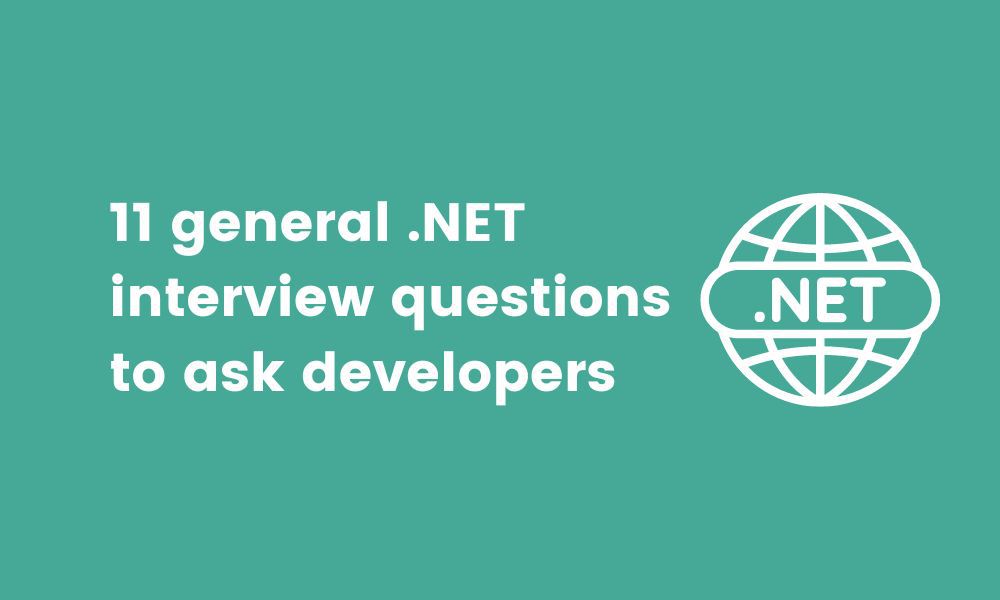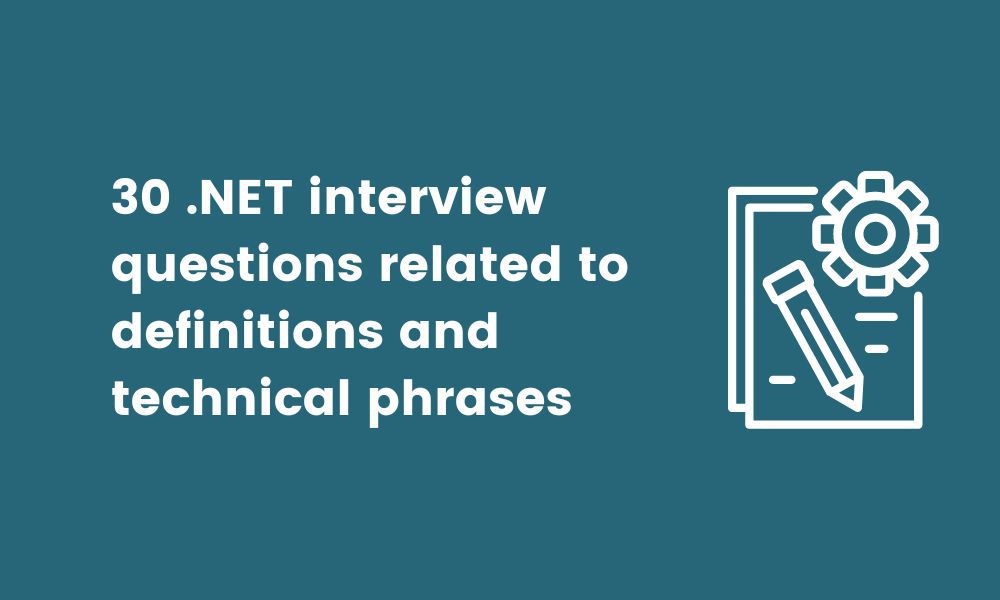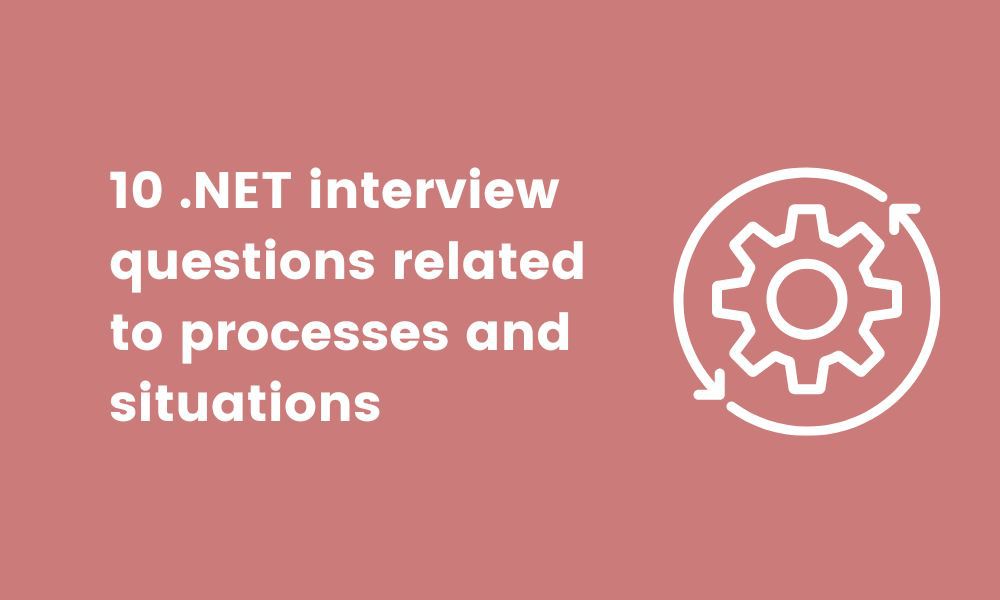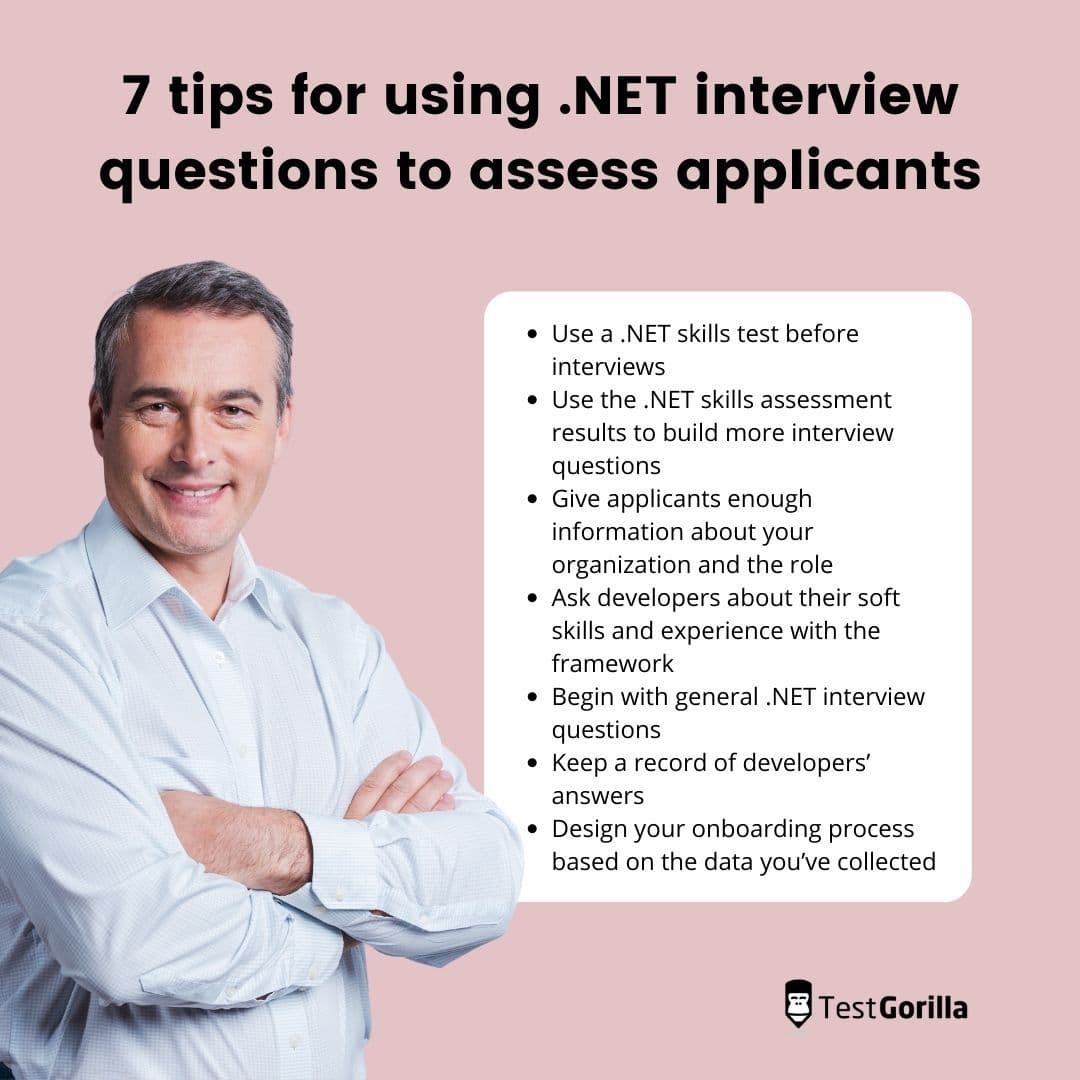50 .NET interview questions to hire top developers
Are you looking for a simple approach to evaluate your developers’ skills and avoid mis-hires?
The interview is the next best method to assess developers’ skills after using a .NET test – and when used in combination, these two methods yield the best results.
But to conduct interviews with applicants and gain meaningful insights into their skills, you need the right .NET interview questions.
Building a list of interview questions isn’t a simple task. But you can’t go wrong with the 50 .NET interview questions we’ve provided in this article.
Have a look at the questions below to decide which ones to ask when you hire a .NET developer.
Table of contents
- 11 general .NET interview questions to ask developers
- 5 general .NET interview questions and answers to assess developers
- 30 .NET interview questions related to definitions and technical phrases
- 5 .NET interview questions and answers related to definitions and technical phrases
- 10 .NET interview questions related to processes and situations
- 5 .NET interview questions and answers related to processes and situations
- 7 tips for using .NET interview questions to assess applicants
- Hire top developers using the right .NET interview questions
11 general .NET interview questions to ask developers
Check out this list of 11 general .NET interview questions to ask developers during interviews and learn more about their knowledge and skills of this framework.
Explain what the .NET framework is.
Name the main types of constructors in C#.
Name the different .NET components.
Explain the difference between unmanaged and managed code.
Explain the difference between constants and read-only variables.
Explain the difference between namespace and assembly.
From where are web forms inherited?
What is the manifest part of assembly?
What is the metadata part of assembly?
Which skills do developers need to use .NET?
Which soft skills do developers need to use .NET?
5 general .NET interview questions and answers to assess developers
Below, you have the answers to the five most critical general .NET interview questions. Use them as a guide when assessing your applicants’ responses.
1. Which skills do developers need to use .NET?
Interviewees who wish to join your organization as .NET developers should know that programming language skills and database knowledge are critical. Can they explain that C# skills and VB.NET skills are vital and that SQL and solid SQLite database knowledge benefits .NET developers?
2. Which soft skills do developers need to use .NET?
Applicants should know that critical thinking and problem-solving skills are vital for .NET developers. They should also know that time management is essential during projects and that communication skills help maintain strong team cohesion and enable teams to achieve their goals.
3. Name the main types of constructors in C#.
Are your applicants aware that there are five main constructors in C#? Your candidates should be able to name each one. The five constructors are:
Private constructors, which are used in classes that only have static members
Static constructors, which initialize static fields of a class
Parameterized constructors, which have one or more parameters
Copy constructors, used for making objects by copying variables from other objects
Default constructors, which don’t have any parameters
4. What is the manifest part of assembly?
Can your applicants explain that the manifest part of assembly refers to the part that features the critical information about the assembly’s version? Can they provide an example of the types of information the manifest part contains, including versioning or scope metadata?
5. What is the metadata part of assembly?
Can your applicants explain that the metadata part of assembly refers to the part that contains the essential binary information that corresponds to the program? Can they explain where the information is stored, such as in memory or as executable files?
The best insights on HR and recruitment, delivered to your inbox.
Biweekly updates. No spam. Unsubscribe any time.
30 .NET interview questions related to definitions and technical phrases
Take a look at these 30 .NET interview questions about definitions and technical phrases. Select some from the list below to build your own.
Explain what boxing means in .NET.
Explain what unboxing means in .NET.
Explain what CLR means.
Explain what JIT is.
Explain what BCL means.
Explain what caching is.
Explain what application domains are.
Explain what cross-page postings are.
Explain what ASP.NEW security controls are.
Explain what EXE is.
Explain what DLL is.
Explain what CTS is.
Explain what constants are.
Explain what read-only variables are.
What does the BCL library contain?
What is meant by namespace?
What is meant by assembly?
Explain what LINQ means.
Explain what MISL is.
What do sealed keywords do in .NET?
What is a private assembly?
What is a shared assembly?
What is MDI?
What is SDI?
Explain what custom control is.
Explain what user control is.
Explain what a garbage collector is.
Explain what CAS is.
Explain what a stack is.
Explain what a heap is.
5 .NET interview questions and answers related to definitions and technical phrases
See below the answers to the vital .NET interview questions about definitions and technical phrases. Use these answers to guide you when assessing your applicants’ responses.
1. Explain what a stack is.
.NET developers hoping to join your team should know that stacks are the equivalent of a stored value type. They may explain that stacks are responsible for monitoring executing threads and contrast this to heaps, which monitor particular objects or data.
2. Explain what LINQ means.
Skilled .NET developers who have applied for your role should know that LINQ is an acronym for Language Integrated Query. They should be able to say when LINQ was introduced (in 2007), explain what it does (adds a data querying functionality to .NET languages), and mention its function as a data manipulator, regardless of the data source.
3. Explain what MISL is.
Knowledgeable applicants should know that MISL is an acronym for Microsoft Intermediate Language. Can your candidates explain that MISL offers developers calling-method instructions and the option to store and initialize values and exception handling?
4. Explain what EXE is.
Can your applicants explain that EXE is an executable module for assembly? Are they able to explain that this executable file is produced when developers build an application and that developers cannot share this file with different applications?
5. Explain what DLL is.
Knowledgeable .NET developers should know that DLL, or Dynamic Link Library, is another executable module for assembly. Are they aware that DLL-executable files are full of code that developers want to hide and that they can share these executable files with other applications?
10 .NET interview questions related to processes and situations
We’ve lined up 10 .NET interview questions related to processes and situations you can ask your developers in an interview. Choose from the list below.
In which situation would you use response.output.write?
In which situation would you use response.redirect?
For which purpose would you use server.transfer?
How would you set user-defined values?
Name some advantages of using sessions.
How would you manually set timeouts for sessions in .NET?
When would you use memory-mapped files in .NET?
When would you use GAC in .NET?
When would you use delegation in .NET?
When would you use MIME in .NET?
5 .NET interview questions and answers related to processes and situations
Check out the sample answers to five of the .NET interview questions related to processes and situations just below. Gauge your applicants’ knowledge by using the responses as a guide.
1. Name some advantages of using sessions.
.NET developer applicants should know that there are numerous advantages of using sessions, including the following points:
Developers can use sessions to store user data for applications
Sessions facilitate object storing in programs
Developers can store individual entities separately with sessions
Sessions are secure options to store objects on a runtime server
2. How would you manually set timeouts for sessions in .NET?
Skilled .NET developers should know how to set timeouts in the .NET framework manually. Can your applicants explain that the best way to set session timeouts in .NET manually is to manipulate the web.config files?
3. When would you use GAC in .NET?
Applicants should be aware that GAC refers to the Global Assembly Cache. Can they explain that they would use GAC to store assemblies that have been shared across applications?
4. How would you set user-defined values?
Can your applicants explain that using the appSettings block within the web.config file is one way to set user-defined values? Can they provide a code sample with which they would set user-defined values?
5. When would you use MIME?
.NET developers hoping to join your team should know that MIME (Multipurpose Internet Mail Extensions) is a standard extension of the SMTP email protocol. It enables the exchange of numerous types of data files (such as images, audio, video, and applications) over email.
7 tips for using .NET interview questions to assess applicants
In this section, you’ll find seven handy tips to help you make the most of your interviews and the hiring process when using .NET interview questions.
1. Use a .NET skills test before interviews
When evaluating .NET developers, use a .NET test before interviewing applicants.
With this approach, you will:
Reduce unconscious bias when shortlisting applicants for the interview phase
Help you disqualify candidates who simply don’t have the right .NET skills and knowledge for your role
Reduce your time to hire and improve the quality of hire
2. Use the .NET skills assessment results to build more interview questions
When you get to the stage where you’re ready to interview candidates, you can use the list in this article to assess applicants’ skills. Additionally, you could add unique questions based on candidates’ skills assessment results.
To do this, follow the steps below:
Check the results of applicants’ .NET test
Consider which skills candidates need to improve
Create questions based on this information to gain a more in-depth understanding of their skill set
3. Give applicants enough information about your organization and the role
The interview process should focus on the exchange of information.
With this in mind, it’s important that you provide applicants with enough information about your organization, the role, and your team’s use of .NET for the applications it develops. Give prospective employees enough details about the team they would join and the projects they would work on.
4. Ask developers about their soft skills and experience with the framework
An important part of the interview process involves learning about your applicants’ soft skills, so dedicate some time to evaluate these.
Ask them how their colleagues would rate their communication skills, how their current employer would rate their problem-solving skills, and how their team leader would rate their time management skills.
Don’t forget to ask them questions about their career progress related to .NET to get an idea of where they see themselves in three or five years.
5. Begin with general .NET interview questions
Start the interview with a couple of general interview questions and enquire about the applicants’ experience with the .NET framework. Build up to more complex, technical questions if hiring a senior developer and then ask situational .NET questions to see how they’d use their skills in tricky situations.
6. Keep a record of developers’ answers
Your review process will be much easier if you take the time to note down your applicants’ responses. Keep a record of their answers to refer to when comparing candidates. You can share the record with other hiring managers and recruiters, or even with candidates’ future managers, which will help make candidate reviews easier.
7. Design your onboarding process based on the data you’ve collected
After bringing the recruitment process to a close and hiring your most promising applicant, you can design an onboarding process tailored to their individual needs. To do this, use the data you’ve collected during the recruitment process to plan meaningful and motivating training sessions that help new developers improve their skills.
Hire top developers using the right .NET interview questions
Hiring developers doesn’t need to be complicated if you have suitable methods in mind.
Always use skills tests such as our .NET test first, to shortlist your best candidates, and then use our .NET interview questions from this article to evaluate whether they meet the requirements for the role.
Use TestGorilla’s skills tests as part of your assessment to test for soft skills, cognitive ability, and culture-add potential, then proceed to the interview stage after you’ve made an initial candidate selection. Find and hire exceptional .NET developers for your team using our .NET skills test interview questions.
Get started for free today and start making better hiring decisions, faster and bias-free.
You've scrolled this far
Why not try TestGorilla for free, and see what happens when you put skills first.






















